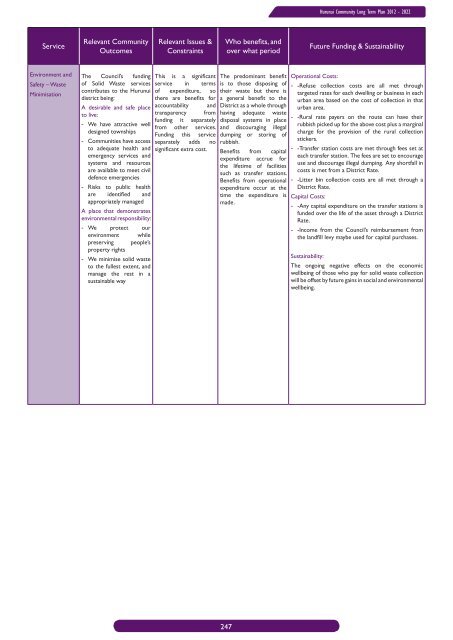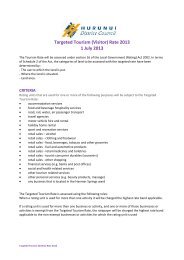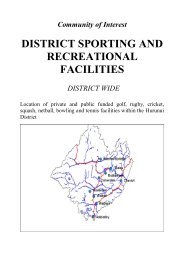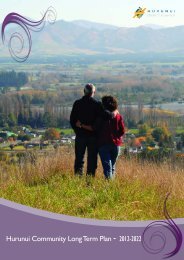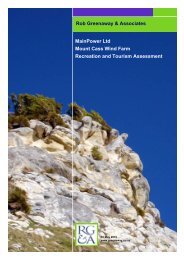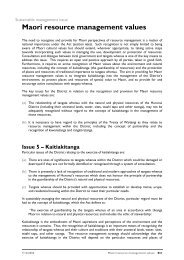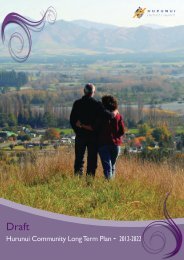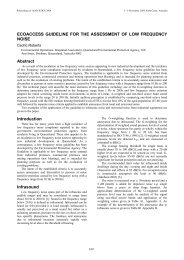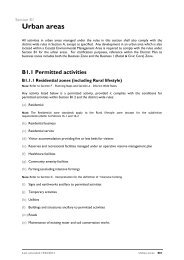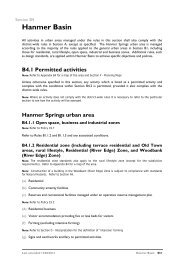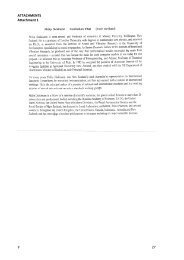Long Term Community Plan 2012-2022 - Hurunui District Council
Long Term Community Plan 2012-2022 - Hurunui District Council
Long Term Community Plan 2012-2022 - Hurunui District Council
Create successful ePaper yourself
Turn your PDF publications into a flip-book with our unique Google optimized e-Paper software.
<strong>Hurunui</strong> <strong>Community</strong> <strong>Long</strong> <strong>Term</strong> <strong>Plan</strong> <strong>2012</strong> - <strong>2022</strong><br />
Service<br />
Relevant <strong>Community</strong><br />
Outcomes<br />
Relevant Issues &<br />
Constraints<br />
Who benefits, and<br />
over what period<br />
Future Funding & Sustainability<br />
Environment and<br />
Safety – Waste<br />
Minimisation<br />
The <strong>Council</strong>’s funding<br />
of Solid Waste services<br />
contributes to the <strong>Hurunui</strong><br />
district being:<br />
A desirable and safe place<br />
to live:<br />
- We have attractive well<br />
designed townships<br />
- Communities have access<br />
to adequate health and<br />
emergency services and<br />
systems and resources<br />
are available to meet civil<br />
defence emergencies<br />
- Risks to public health<br />
are identified and<br />
appropriately managed<br />
A place that demonstrates<br />
environmental responsibility:<br />
- We protect our<br />
environment while<br />
preserving people’s<br />
property rights<br />
- We minimise solid waste<br />
to the fullest extent, and<br />
manage the rest in a<br />
sustainable way<br />
This is a significant<br />
service in terms<br />
of expenditure, so<br />
there are benefits for<br />
accountability and<br />
transparency from<br />
funding it separately<br />
from other services.<br />
Funding this service<br />
separately adds no<br />
significant extra cost.<br />
The predominant benefit<br />
is to those disposing of<br />
their waste but there is<br />
a general benefit to the<br />
<strong>District</strong> as a whole through<br />
having adequate waste<br />
disposal systems in place<br />
and discouraging illegal<br />
dumping or storing of<br />
rubbish.<br />
Benefits from capital<br />
expenditure accrue for<br />
the lifetime of facilities<br />
such as transfer stations.<br />
Benefits from operational<br />
expenditure occur at the<br />
time the expenditure is<br />
made.<br />
Operational Costs:<br />
- -Refuse collection costs are all met through<br />
targeted rates for each dwelling or business in each<br />
urban area based on the cost of collection in that<br />
urban area.<br />
- -Rural rate payers on the route can have their<br />
rubbish picked up for the above cost plus a marginal<br />
charge for the provision of the rural collection<br />
stickers.<br />
- -Transfer station costs are met through fees set at<br />
each transfer station. The fees are set to encourage<br />
use and discourage illegal dumping. Any shortfall in<br />
costs is met from a <strong>District</strong> Rate.<br />
- -Litter bin collection costs are all met through a<br />
<strong>District</strong> Rate.<br />
Capital Costs:<br />
- -Any capital expenditure on the transfer stations is<br />
funded over the life of the asset through a <strong>District</strong><br />
Rate.<br />
- -Income from the <strong>Council</strong>’s reimbursement from<br />
the landfill levy maybe used for capital purchases.<br />
Sustainability:<br />
The ongoing negative effects on the economic<br />
wellbeing of those who pay for solid waste collection<br />
will be offset by future gains in social and environmental<br />
wellbeing.<br />
247


